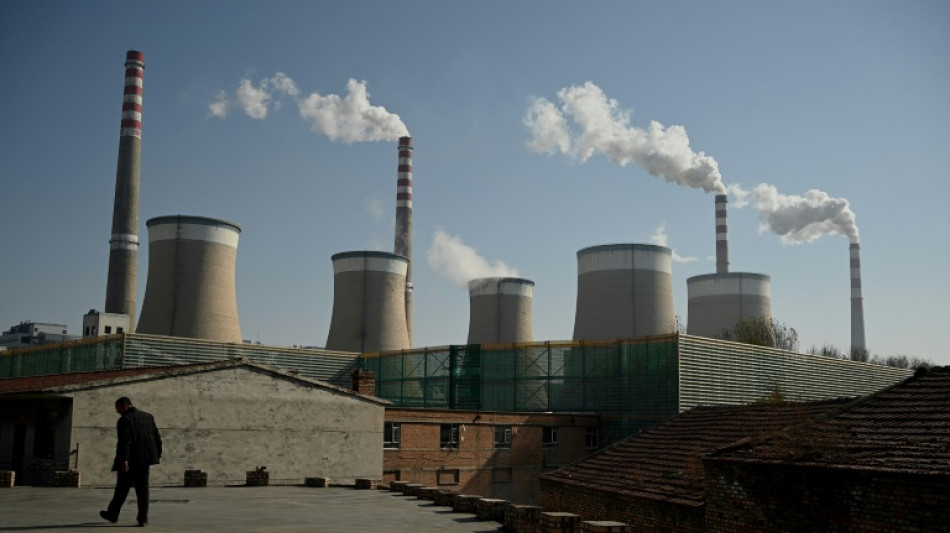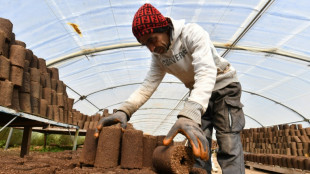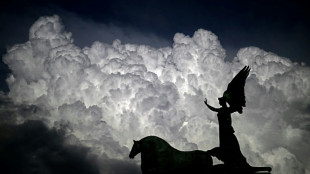
-
 Saka 'ready to go' after long injury lay-off: Arteta
Saka 'ready to go' after long injury lay-off: Arteta
-
Ingebrigtsen Sr, on trial for abusing Olympic champion, says he was 'overly protective'

-
 Tourists and locals enjoy 'ephemeral' Tokyo cherry blossoms
Tourists and locals enjoy 'ephemeral' Tokyo cherry blossoms
-
Khamenei warns of 'strong' response if Iran attacked

-
 France fines Apple 150 million euros over privacy feature
France fines Apple 150 million euros over privacy feature
-
UK PM urges nations to smash migrant smuggling gangs 'once and for all'

-
 Thai authorities probe collapse at quake-hit construction site
Thai authorities probe collapse at quake-hit construction site
-
France's Le Pen convicted in fake jobs trial

-
 Chinese tech giant Huawei says profits fell 28% last year
Chinese tech giant Huawei says profits fell 28% last year
-
Trump says confident of TikTok deal before deadline

-
 Myanmar declares week of mourning as hopes fade for quake survivors
Myanmar declares week of mourning as hopes fade for quake survivors
-
Japan's Nikkei leads hefty market losses, gold hits record

-
 Tears in Taiwan for relatives hit by Myanmar quake
Tears in Taiwan for relatives hit by Myanmar quake
-
Venezuela says US revoked transnational oil, gas company licenses

-
 'Devastated': Relatives await news from Bangkok building collapse
'Devastated': Relatives await news from Bangkok building collapse
-
Arsenal, Tottenham to play pre-season North London derby in Hong Kong

-
 Japan's Nikkei leads hefty equity market losses; gold hits record
Japan's Nikkei leads hefty equity market losses; gold hits record
-
Israel's Netanyahu picks new security chief, defying legal challenge

-
 Trump says US tariffs to hit 'all countries'
Trump says US tariffs to hit 'all countries'
-
Prayers and tears for Eid in quake-hit Mandalay

-
 After flops, movie industry targets fresh start at CinemaCon
After flops, movie industry targets fresh start at CinemaCon
-
Tsunoda targets podium finish in Japan after 'unreal' Red Bull move

-
 French chefs await new Michelin guide
French chefs await new Michelin guide
-
UK imposes travel permit on Europeans from Wednesday

-
 At his academy, Romanian legend Hagi shapes future champions
At his academy, Romanian legend Hagi shapes future champions
-
Referee's lunch break saved Miami winner Mensik from early exit

-
 Djokovic refuses to discuss eye ailment after shock Miami loss
Djokovic refuses to discuss eye ailment after shock Miami loss
-
Mitchell magic as Cavs bag 60th win, Pistons and T'Wolves brawl

-
 Mensik shocks Djokovic to win Miami Open
Mensik shocks Djokovic to win Miami Open
-
Duterte lawyer: 'compelling' grounds to throw case out

-
 What happens on Trump's 'Liberation Day' and beyond?
What happens on Trump's 'Liberation Day' and beyond?
-
Clock ticks on Trump's reciprocal tariffs as countries seek reprieve

-
 Japan-Australia flagship hydrogen project stumbles
Japan-Australia flagship hydrogen project stumbles
-
Musk deploys wealth in bid to swing Wisconsin court vote

-
 Mensik upsets Djokovic to win Miami Open
Mensik upsets Djokovic to win Miami Open
-
China manufacturing activity grows at highest rate in a year

-
 'Waited for death': Ex-detainees recount horrors of Sudan's RSF prisons
'Waited for death': Ex-detainees recount horrors of Sudan's RSF prisons
-
Japan's Nikkei leads big losses in Asian markets as gold hits record

-
 Rescue hopes fading three days after deadly Myanmar quake
Rescue hopes fading three days after deadly Myanmar quake
-
'Basketbrawl' as seven ejected in Pistons-Wolves clash

-
 Four men loom large in Microsoft history
Four men loom large in Microsoft history
-
Computer pioneer Microsoft turns 50 in the age of AI

-
 Trump calls out both Putin and Zelensky over ceasefire talks
Trump calls out both Putin and Zelensky over ceasefire talks
-
Kim Hyo-joo tops Vu in playoff to win LPGA Ford Championship

-
 Economy and especially Trump: Canadians' thoughts on campaigns
Economy and especially Trump: Canadians' thoughts on campaigns
-
Liberal PM Carney takes lead four weeks before Canada vote

-
 SpaceX to launch private astronauts on first crewed polar orbit
SpaceX to launch private astronauts on first crewed polar orbit
-
Australia open door for Kerr's return as Matildas captain

-
 The Premier League's unlikely pretenders to Champions League riches
The Premier League's unlikely pretenders to Champions League riches
-
IFabric Corp Reports Record Q4 and Full Year 2024 Revenues and Strong Profitability


Three decades ago world told to 'act now' on climate
With the planet facing the "potentially serious consequences" of global warming, UN experts writing 32 years ago urged an indifferent world to take immediate action to reduce greenhouse gas emissions.
Planet-warming carbon pollution has increased ever since.
In 1990 the Intergovernmental Panel on Climate Change produced the first trio of reports in a cycle of climate change assessments -- one on the physical science of warming, one on the impacts and one on solutions -- that has repeated roughly every six years.
While the authors of the most recent IPCC report on impacts, released in February this year, can say the evidence of harm to humanity and the entire planet is "unequivocal", the authors of those first reports 30 years ago could not be as forthright.
But they were clear that the risks were so high we couldn't afford to wait.
"The potentially serious consequences of climate change on the global environment," they said "give sufficient reasons to begin by adopting response strategies that can be justified immediately even in the face of such significant uncertainties".
They said cuts to the planet-warming gases that humans were pumping into the atmosphere should be swift and drastic.
"Because climate change could potentially result in significant impacts on the global environment and human activities, it is important to begin considering now what measures might be taken in response," the report said.
There was never an easy answer.
The scientists writing the 1990 report underscored the need to reduce emissions of different gases -- especially carbon dioxide and methane -- across a range of different sectors, from energy generation to agriculture.
"Our understanding has been refined over 40 years, but the alarm has been ringing since the first IPCC report," said Celine Guivarch, one of the authors of the latest IPCC assessment of solutions, set to be published on April 4.
With each new cycle of climate evaluation, the description of risks in the IPCC reports has become ever clearer and more urgent. The forecasts have become increasingly catastrophic.
Meanwhile, emissions have risen almost every year, only breaking their relentless pace because of major economic crises, such as the one triggered by the Covid-19 pandemic.
As a result, CO2 in the atmosphere has never been higher.
According to data from the Mauna Loa observatory in Hawaii, which has monitored the atmosphere for decades, C02 concentrations reached 416 parts per million in 2021, up from 354 ppm in 1990 when the first IPCC report was published.
Earth has experienced periods of much higher C02 concentrations in the distant past.
But in its report on the physical science released in August 2021, the IPCC said the rate the gas has increased in the atmosphere since 1900 "is at least 10 times faster than at any other time during the last 800,000 years".
"Current levels of atmospheric CO2 have not been experienced for at least two million years," it added.
D.Sawyer--AMWN

